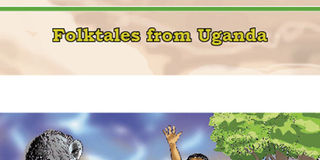Prime
Recording Uganda’s cultural folktales

The book’s cover.
What you need to know:
Diverse. The book documents more than 100 tales from various ethnic groups in Uganda.
Traditional Wisdom: Folktales from Uganda is praised by critics as a “definitive collection of Ugandan folktales from diverse cultures”, a ‘gem for enthusiasts of cultural studies, scholars of orature and folklore, and lovers of stories” and as a “tome that takes the reader galloping through a millennium of folk-telling on a written chariot of dramatic script”. This book is the result of research carried out on the folklores of the people of Uganda that started in 2007. The main objective of the project, writes lead researcher and co-editor Dipio, an associate professor of literature, “was to document and disseminate the richly imaginative cultural forms of Ugandan people, using a multi-media approach”. Dipio adds that “the specific focus on folktales was occasioned by its ability to embed the values of a people like no other genre of folklore can.
Dipio, who has written and co-edited several publications in her wide ranging research areas of literature, film, media, religion and cultural studies, says the researchers and their assistants collected more than 100 tales from various ethnic groups in Uganda in the local languages in order to publish a bi-lingual collection.
“This, however, was dropped for the practical reasons of the voluminous size of such a publication, and for the fact that readers may be interested in only one or two languages at most. This decision comes with a cost: the loss of “flavour” in the translated stories. The editors have, however, tried not to “drain” the tales of their oral features in course of translation,” writes Dipio in her preface to the book. She aptly notes that “there are expressions in the local languages that do not have equivalents in the English translation”.
Book arrangement
The book is divided into five sections complete with an endorsement and index of narrators and narratives. The narratives, too, are arranged in five sections based on the various themes the folktales address. The themes in the stories could ring a bell on contemporary issues. There are stories touching on themes such as treachery, greed, betrayal and the price one pays for each of these almost universal vice. Some stories explain how and why things are the way they are today. For instance, the origin of beer, water masses, forests, and mountains, is explained.
Each story is summarised with an appealing realistic illustration drawn by Richard Kato that the designer, George Kangara Karanja, has used well on the pages and the cover of the book.
Austin Bukenya, a well-known scholar of folklore, describes the book as “the latest fruit from Makerere’s long and passionate engagement with oral art.”
Aaron Mushengyezi, a senior lecturer in the Department of Literature at Makerere University, says this book replaces the old griots “who chronicled both the official and popular stories of their times so that traditional wisdom is passed on. Where the script takes away from the oral nature of these tales, the audio and visual formats return the oral quality that is lost in translation from local languages to English”.
foreword > James Ogoola, Former Principal Judge of the High Court
Folktales of Africa were at once simple to grasp, but equally subtle – pregnant with complex layer upon layer of underlying mystery and meaning, hidden underneath the seemingly simple surface Simplicity of the stories is only skin deep. Underneath lies deep complexity. The format of animal animation tells a revealing tale of human conduct, a people’s philosophy and psychology, as well as their ethics and metaphysics’. African folktales are steeped in a pyramid of ancient wisdom whose tips tell only tale nuggets of the mystical treasures lying buried in the voluptuous secret vaults hidden down below’.
Book title. Traditional Wisdom: Folktales from Uganda.
Format. Print, audio and audiovisual. It is recommended that one purchase the complete package: print, DVD and CD.
Editors. Dominica Dipio of Makerere University and Stuart Sillars of University of Bergen, Norway.
Publishers. ComMattersKenya of Nairobi, Kenya.
Price. The book alone costs Shs30,000. The book, DVD and CD cost Shs50,000. The DVD and CD cost Shs14, 000.
Available at. Makerere University and University of Nairobi in Kenya.




